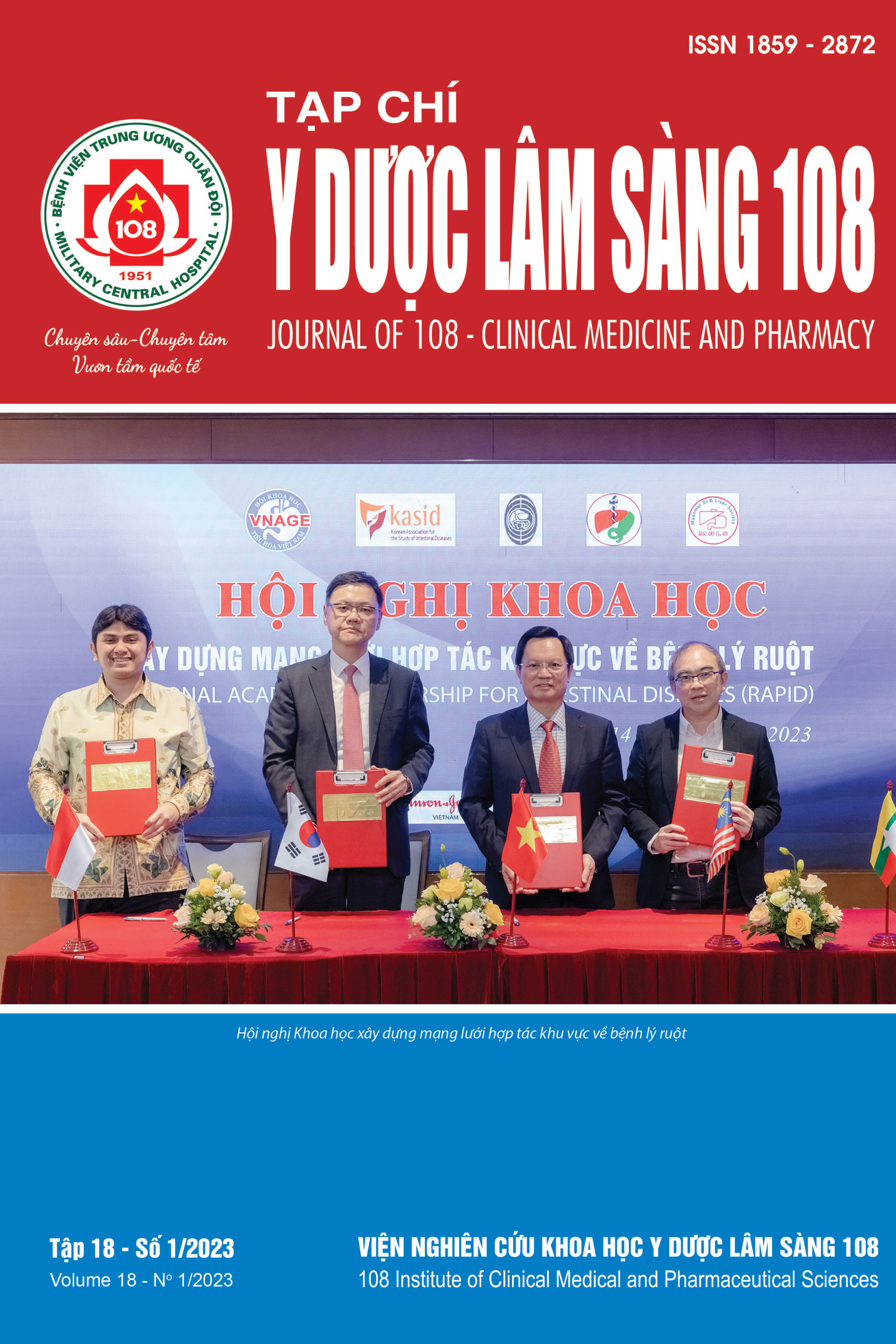Investigation of dupA gene of Helicobacter pylori in gastric cancer and chronic gastritis patients
Main Article Content
Keywords
Helicobacter pylori, dupA gene, gastric cancer, chronic gastritis
Abstract
Objective: To investigate the association of H. pylori dupA genotype with gastroduodenal disease in Vietnam. Subject and method: A cross-sectional study of 179 patients with H. pylori infection, in which 89 patients with gastric cancer and 90 patients with chronic gastritis diagnosed by histopathology. DupA gene status was determined by realtime PCR technique. Result: The rate of H. pylori infection with dupA positive was 10.1%; there was no difference between the 2 groups of chronic gastritis and gastric cancer (11.1% vs 9.0%; p>0.05). Conclusion: In Vietnam, the dupA gene is not a risk factor for gastroduodenal disease related to H. pylori.
Article Details
References
1. Lu Hong, Ping-I Hsu, David Y Graham et al (2005) Duodenal ulcer promoting gene of Helicobacter pylori. Gastroenterology 128(4): 833-848.
2. Nguyen LT, Uchida T, Tsukamoto Y et al (2010) Helicobacter pylori dupA gene is not associated with clinical outcomes in the Japanese population. Clinical microbiology infection 16(8): 1264-1269.
3. Phuc Bui Hoang Tuan, Vo Phuoc Dung, Ho Dang Quy, Tran Thanh Binh et al (2021) Helicobacter pylori type 4 secretion systems as gastroduodenal disease markers. Scientific reports 11(1): 1-12.
4. Hussein Nawfal R, Richard H Argent, Christian K Marx et al (2010) Helicobacter pylori dupA is polymorphic, and its active form induces proinflammatory cytokine secretion by mononuclear cells. The Journal of infectious diseases 202(2): 261-269.
5. Shiota S, Matsunari O, Watada M et al (2010) Systematic review and meta-analysis: the relationship between the Helicobacter pylori dupA gene and clinical outcomes. Gut 2(1): 13.
6. Sallas ML, Melchiades JL, Zabaglia LM et al (2017) Prevalence of Helicobacter pylori vacA, cagA, dupA and oipA Genotypes in Patients with Gastric Disease. Advances in Microbiology 7(1): 1-9.
7. Gomes LI, Rocha GA, Rocha AM, et al (2008) Lack of association between Helicobacter pylori infection with dupA-positive strains and gastroduodenal diseases in Brazilian patients. International journal of medical microbiology 298(3-4): 223-230.
8. Jung SW, Sugimoto M, Shiota S et al (2012) The intact dupA cluster is a more reliable Helicobacter pylori virulence marker than dupA alone. Infect Immun 80(1): 381-387.
9. Argent RH, Burette A, Miendje Deyi VY et al (2007) The presence of dupA in Helicobacter pylori is not significantly associated with duodenal ulceration in Belgium, South Africa, China, or North America. Clinical infectious diseases 45(9): 1204-1206.
10. Zhang Z, Zheng Q, Chen X et al (2008) The Helicobacter pylori duodenal ulcer promoting gene, dupA in China. BMC gastroenterology 8(1): 49.
11. Imkamp F, Lauener FN, Pohl D et al (2019) Rapid characterization of virulence determinants in Helicobacter pylori isolated from non-atrophic gastritis patients by next-generation sequencing. Journal of clinical medicine 8(7): 1030.
2. Nguyen LT, Uchida T, Tsukamoto Y et al (2010) Helicobacter pylori dupA gene is not associated with clinical outcomes in the Japanese population. Clinical microbiology infection 16(8): 1264-1269.
3. Phuc Bui Hoang Tuan, Vo Phuoc Dung, Ho Dang Quy, Tran Thanh Binh et al (2021) Helicobacter pylori type 4 secretion systems as gastroduodenal disease markers. Scientific reports 11(1): 1-12.
4. Hussein Nawfal R, Richard H Argent, Christian K Marx et al (2010) Helicobacter pylori dupA is polymorphic, and its active form induces proinflammatory cytokine secretion by mononuclear cells. The Journal of infectious diseases 202(2): 261-269.
5. Shiota S, Matsunari O, Watada M et al (2010) Systematic review and meta-analysis: the relationship between the Helicobacter pylori dupA gene and clinical outcomes. Gut 2(1): 13.
6. Sallas ML, Melchiades JL, Zabaglia LM et al (2017) Prevalence of Helicobacter pylori vacA, cagA, dupA and oipA Genotypes in Patients with Gastric Disease. Advances in Microbiology 7(1): 1-9.
7. Gomes LI, Rocha GA, Rocha AM, et al (2008) Lack of association between Helicobacter pylori infection with dupA-positive strains and gastroduodenal diseases in Brazilian patients. International journal of medical microbiology 298(3-4): 223-230.
8. Jung SW, Sugimoto M, Shiota S et al (2012) The intact dupA cluster is a more reliable Helicobacter pylori virulence marker than dupA alone. Infect Immun 80(1): 381-387.
9. Argent RH, Burette A, Miendje Deyi VY et al (2007) The presence of dupA in Helicobacter pylori is not significantly associated with duodenal ulceration in Belgium, South Africa, China, or North America. Clinical infectious diseases 45(9): 1204-1206.
10. Zhang Z, Zheng Q, Chen X et al (2008) The Helicobacter pylori duodenal ulcer promoting gene, dupA in China. BMC gastroenterology 8(1): 49.
11. Imkamp F, Lauener FN, Pohl D et al (2019) Rapid characterization of virulence determinants in Helicobacter pylori isolated from non-atrophic gastritis patients by next-generation sequencing. Journal of clinical medicine 8(7): 1030.
 ISSN: 1859 - 2872
ISSN: 1859 - 2872
